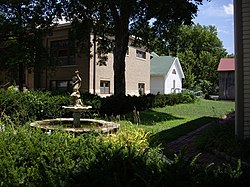Old Peabody Library | |
 Library in 1908 | |
Location within the state of Kansas | |
| Location | 106 E Division Ave Peabody, Kansas, 66866 |
|---|---|
| Coordinates | 38°10′2″N97°6′22″W / 38.16722°N 97.10611°W |
| Built | 1875 |
| Architectural style | Vernacular |
| Restored | 1927 and 1960 |
| Part of | Peabody Downtown Historic District (ID98000590) |
| NRHP reference No. | 73000765 [1] |
| Added to NRHP | July 2, 1973 |
Peabody Historical Library Museum, also known under the older name of Old Peabody Library, was listed on the National Register of Historic Places (NRHP) in 1973. It is located in the Downtown Historic District of Peabody, Kansas. The building has state significance because it was the first free tax-supported library in Kansas. [2]

